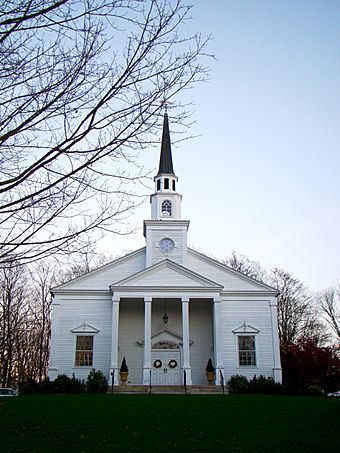Canterbury Center Historic District facts for kids
Quick facts for kids |
|
|
Canterbury Center Historic District
|
|

Canterbury Center Historic District is anchored by the area's Congregational Church
|
|
| Location | Roughly along Elmdale, Library, N. Canterbury, S. Canterbury, and Westminster Rds., Canterbury, Connecticut |
|---|---|
| Area | 85 acres (34 ha) |
| Architectural style | Colonial, Federal, Vernacular |
| NRHP reference No. | 97001446 |
| Added to NRHP | April 10, 1998 |
The Canterbury Center Historic District is a special area in Canterbury, Connecticut. It's where many old and important buildings are protected. This district is built around the town's central park, called Canterbury Green. This green is where two main roads, Route 169 and Route 14, meet. This spot has been the heart of Canterbury since 1705. You can find many beautiful buildings from the 1700s and early 1800s here. It was added to the National Register of Historic Places in 1998. This means it's officially recognized as important history.
Contents
Exploring Canterbury's Historic Center
English settlers first came to this area around the early 1700s. In 1704, Canterbury officially became its own town. The town green was created in 1705. It's about 3.5 acres big. People bought the land to build a 'meeting house,' which was like a church and community center. The first meeting house was built in 1711. Today, the Congregational Church stands on that same spot. It was built in the 1960s in a style called Federal Revival.
Canterbury's first cemetery, or graveyard, was started around 1720. It's just north of the green. The town grew as a busy crossroads. It served local people and travelers on the two main roads. It was also the main place for learning in town. An early school was founded in the 1790s.
The Prudence Crandall School
A very important school for African-American girls was started here in 1831. This school was founded by Prudence Crandall. The Prudence Crandall House is now a museum in the district. It is also a National Historic Landmark. This means it's a very important historical site in the United States. The town's economic importance later slowed down. This happened when the railroad was built, because it didn't pass through Canterbury Center.
Buildings and Architecture
The historic district spreads out from the town green along the main roads. Most of the buildings are homes. They are usually made of wood and are 1-1/2 or 2-1/2 stories tall. Almost all of them were built before 1850. They show styles like Georgian Colonial, Federal, or Greek Revival. There is only one house in a later style called Italianate.
Other buildings include two community halls. One is a Grange hall, and another is the Finnish Hall. The town's library is also here. It's in a Greek Revival building that used to be a one-room schoolhouse. The brick town hall was built in the 1900s. While it's part of the area, it's not as old as the other historic buildings.
Images for kids
 | Bayard Rustin |
 | Jeannette Carter |
 | Jeremiah A. Brown |






